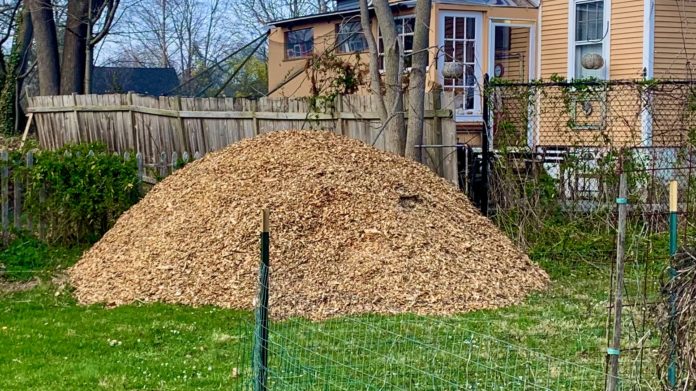I worked from home today because there wasn’t time to get back from New York and make it to the Maundy Thursday service in Westbrook, where I am interim pastor. I met a friend for coffee and as I was walking home I noticed a crew taking down a dead tree next to the coffee shop across the street. Then I noticed they were also working on two trees that stand between our house and our neighbors. They are–well, were–big trees, probably sixty feet tall. We’ve heard talk for a couple of years that they needed to come down, but nothing happened until today.
As I worked I could hear the hum of the chain saw and the grind of the wood chipper that made me want to quit work and watch Fargo again–except if the guys in Fargo had had this chipper they wouldn’t have been caught. The tree guy was loading limbs that were six or eight inches in diameter and the chipper ate them right up.
Though we are still a ways from really planting, our garden crew is getting things ready. Tom, the one who actually knows what we are doing, is growing seedlings at his house. We are making plans to put up a rabbit-proof fence so we can enjoy the green beans this year, and we have plans this weekend to mark the beds and begin to wake things up a bit. As I watched the chips fly into the back of the big truck, I thought I might as well ask if they would be willing to let us use them for the garden. And they were. By late afternoon, our side yard felt strangely expansive and I had a huge pile of wood chips next to the garden.
On Saturday, we will begin to line the paths between the beds in our garden with the wood chips, but more than that, they will, over time, turn back into soil. We also have plans the spread mushroom spore on the chips so we can harvest even from our pathways. The trees are gone and they live on, even though they will be forgotten, for the most part. We will miss them, and we will get used to the space between our houses, or we will plant new trees that will grow beyond our time here–because we will live on and be forgotten as well.
In the middle of his amazing poem, “Manifesto: The Mad Farmer Liberation Front,” Wendell Berry writes,
Invest in the millennium. Plant sequoias.
Say that your main crop is the forest
that you did not plant,
that you will not live to harvest.
Say that the leaves are harvested
when they have rotted into the mold.
Call that profit. Prophesy such returns.
Put your faith in the two inches of humus
that will build under the trees
every thousand years.
And then the poem closes with this line:
Practice resurrection
Perhaps to live and die and live again has more to do with wood chips than banking on eternal life. Resurrection isn’t our ticket out, it is a statement of solidarity with all that is, all of creation, all of life. We are stardust. We are compost. We are created in the image of God, resurrection practitioners.
Peace,
Milton

A big YES to this writing, Milton! Thank you deeply!
and we’ve got to get ourselves back to the garden
From my own long experience, working in the garden is a space of relaxation. Resurrection practitioner sounds really comforting to me. I just lost a good friend, and she loved having her hands in the dirt as well. Thank you, Milton